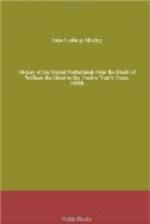“As for neighbour Barneveld,” said recorder Aerssens, little dreaming of the foul witness he was to bear against that neighbour at a terrible moment to come, “I do what I can and wish to help him with my blood. He is more courageous than I. I should have sunk long ago, had I been obliged to stand against such tempests. The Lord God will, I hope, help him and direct his understanding for the good of all Christendom, and for his own honour. If he can steer this ship into a safe harbour we ought to raise a golden statue of him. I should like to contribute my mite to it. He deserves twice much honour, despite all his enemies, of whom he has many rather from envy than from reason. May the Lord keep him in health, or it will go hardly with us all.”
Thus spoke some of his grateful countrymen when the Advocate was contending at a momentous crisis with storms threatening to overwhelm the republic. Alas! where is the golden statue?
He believed that the truce was the most advantageous measure that the country could adopt. He believed this with quite as much sincerity as Maurice held to his conviction that war was the only policy. In the secret letter of the French ambassador there is not a trace of suspicion as to his fidelity to the commonwealth, not the shadow of proof of the ridiculous accusation that he wished to reduce the provinces to the dominion of Spain. Jeannin, who had no motive for concealment in his confidential correspondence with his sovereign, always rendered unequivocal homage to the purity and patriotism of the Advocate and the Prince.
He returned to the States-General and to the discharge of his functions as Advocate-General of Holland. His policy for the time was destined to be triumphant, his influence more extensive than ever. But the end of these calumnies and anonymous charges was not yet.




